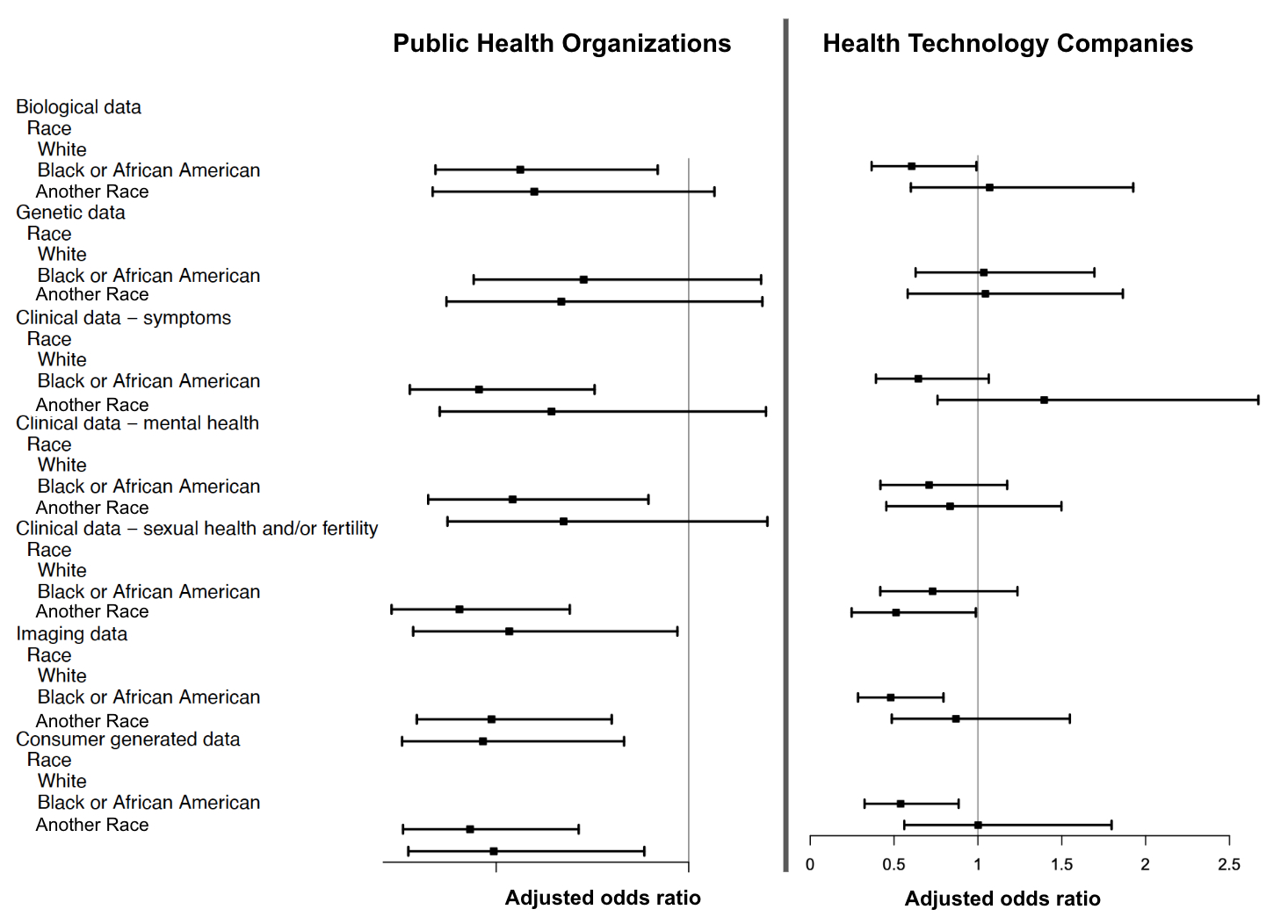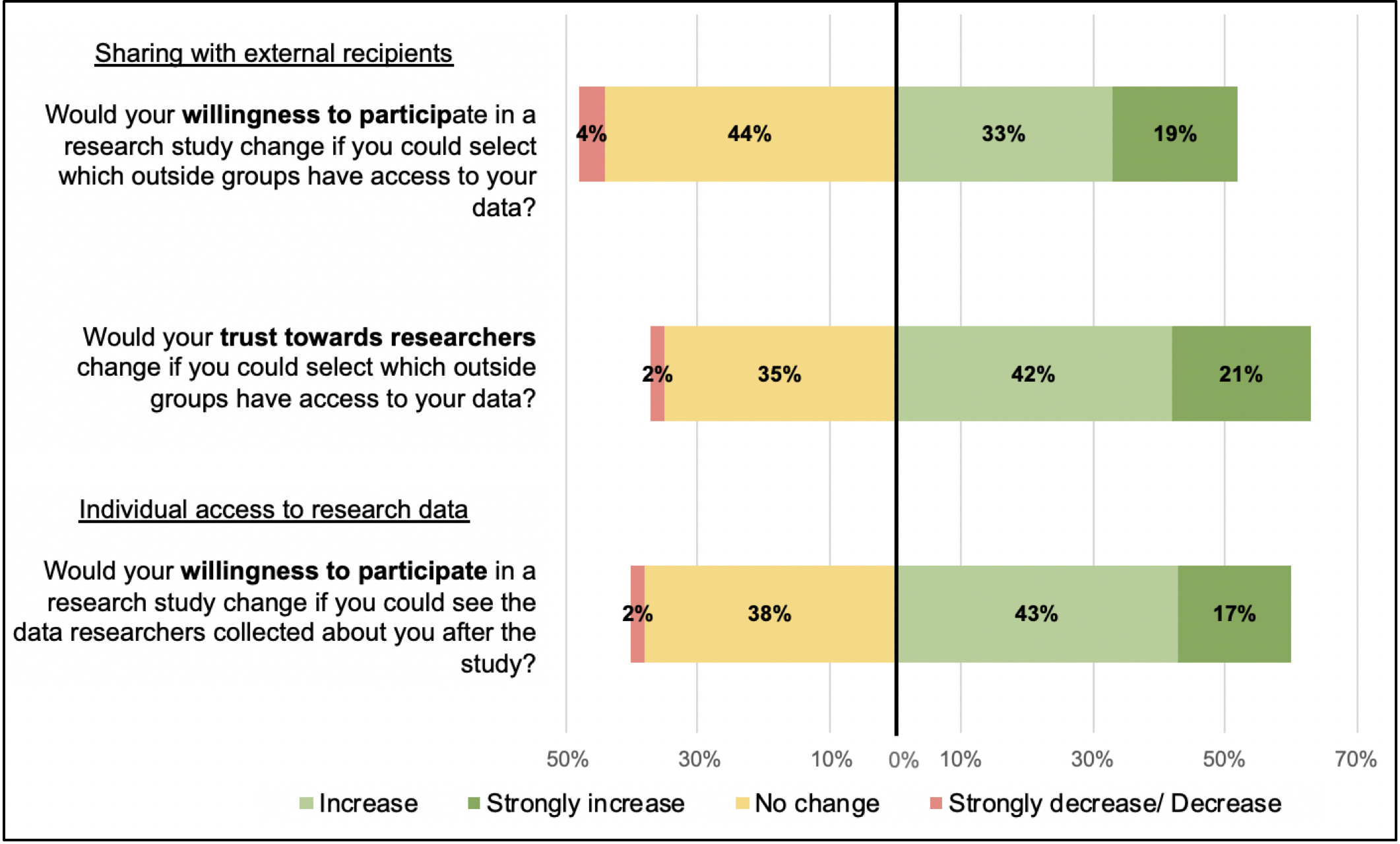Final ID: MDP1773
Navigating Trust and Preferences in Research Data Sharing: Addressing Racial Disparities for Inclusive Research Practices
Abstract Body (Do not enter title and authors here): OBJECTIVE
Contemporary data sharing policies from the National Institutes of Health have expanded data sharing. Participants' perspectives are not well understood and could have an adverse impact on participation in cardiac research. We evaluated participants' preferences for health data, and strategies to enhance trust in data sharing practices.
METHODS
In March 2023, we conducted a nationally representative online survey with 610 US adults. We implemented a cross-sectional survey that assessed: (1) participant preferences about health data they are willing to share with external entities (e.g. health policy institutions, public health organizations, health technology companies, private foundations, etc), and (2) the impact on trust in research if participants could decide which external recipients (e.g, clinical symptom, biological, mental health, sexual health) receive the data. We used logistic regression models to assess sociodemographic variances in their willingness to share different types of data.
RESULTS
Among 610 participants, the mean age was 46 years (± 16; range 19-93) of which 50% were female, 77% identified as White and 7% identified as Hispanic/Latinx. Figure 1 shows the adjusted odds ratio (ORs) and 95% confidence intervals (95% CI) for willingness to share different data types with public health institutions and health technology companies by self-reported race. Black participants were significantly less likely to share most health data with public health organizations, including mental health (biological (OR: 0.562 [95% CI 0.342, 0.920]), clinical symptom (OR:0.455 [95% CI 0.275, 0.756]), and imaging data (OR:0.488 [95% CI 0.258, 0.714]) compared to White participants. Fewer racial differences were noted for sharing different types of data with health technology companies. Moreover, 63% of participants expressed that their trust in researchers would improve if given control over the data recipients (Figure 2).
DISCUSSION
Participants exhibit reluctance to share specific types of personal research data, emphasizing strong preferences regarding external data access. This highlights the need for a critical reassessment of current data sharing policies to align with participant concerns.
CONCLUSION
It is imperative for data sharing policies to integrate diverse patient viewpoints to mitigate the risk of distrust and a potential unintended consequence of lower participation among racial and ethnic minority participants in cardiac research.
Contemporary data sharing policies from the National Institutes of Health have expanded data sharing. Participants' perspectives are not well understood and could have an adverse impact on participation in cardiac research. We evaluated participants' preferences for health data, and strategies to enhance trust in data sharing practices.
METHODS
In March 2023, we conducted a nationally representative online survey with 610 US adults. We implemented a cross-sectional survey that assessed: (1) participant preferences about health data they are willing to share with external entities (e.g. health policy institutions, public health organizations, health technology companies, private foundations, etc), and (2) the impact on trust in research if participants could decide which external recipients (e.g, clinical symptom, biological, mental health, sexual health) receive the data. We used logistic regression models to assess sociodemographic variances in their willingness to share different types of data.
RESULTS
Among 610 participants, the mean age was 46 years (± 16; range 19-93) of which 50% were female, 77% identified as White and 7% identified as Hispanic/Latinx. Figure 1 shows the adjusted odds ratio (ORs) and 95% confidence intervals (95% CI) for willingness to share different data types with public health institutions and health technology companies by self-reported race. Black participants were significantly less likely to share most health data with public health organizations, including mental health (biological (OR: 0.562 [95% CI 0.342, 0.920]), clinical symptom (OR:0.455 [95% CI 0.275, 0.756]), and imaging data (OR:0.488 [95% CI 0.258, 0.714]) compared to White participants. Fewer racial differences were noted for sharing different types of data with health technology companies. Moreover, 63% of participants expressed that their trust in researchers would improve if given control over the data recipients (Figure 2).
DISCUSSION
Participants exhibit reluctance to share specific types of personal research data, emphasizing strong preferences regarding external data access. This highlights the need for a critical reassessment of current data sharing policies to align with participant concerns.
CONCLUSION
It is imperative for data sharing policies to integrate diverse patient viewpoints to mitigate the risk of distrust and a potential unintended consequence of lower participation among racial and ethnic minority participants in cardiac research.
More abstracts on this topic:
A Porcine Model of Cardiac Arrest Without Pre-Arrest Fluid Loading, Sternal Molding, or Epinephrine
Paradis Aidan, Paradis Norman, Gaddy David, Moodie Karen, Mader Timothy, Dufresne Alexandre, Couturier Christine, Dufresne Simon, Davis Daniel, Sims Christopher
Assessing Social Vulnerability's Effect on Patient Outcomes in Los Angeles County Stroke Patients Among a Health System and Its Impact on Health DisparitiesMayorga Lina, Bohn Joe, Levin Dr Bruce L, Kim-tenser May, Sanossian Nerses, Towfighi Amytis


